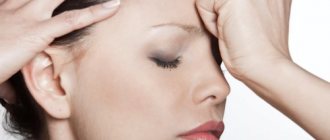Tinnitus, or scientifically tinnitus, is not a real sound, but an illusion of sound that occurs in the nerve circuits of the brain. It can be heard as squeaking, ringing, hissing, buzzing, clicking, etc. The volume of tinnitus can range from barely noticeable to severe, interfering with a person's ability to carry out their normal activities.
About 15% of the world's population suffers from tinnitus. If a squeak or hiss appears and disappears within a few minutes or hours, this is not a cause for concern. But if tinnitus becomes constant, interferes with work during the day, and prevents you from sleeping at night, then it’s time to make an appointment with a specialist. This may be a symptom of developing hearing or nervous system problems.
Causes of tinnitus
- The main cause of persistent tinnitus is hearing impairment. 80% of patients who turn to a neurologist or ENT specialist with a noise complaint already have varying degrees of hearing impairment.
- A concussion can damage the inner ear, causing tinnitus.
- Sulfur plug. When a large amount of wax accumulates in the ear, hearing deterioration occurs, but this problem can be solved in a few minutes in the ENT doctor’s office.
- Problems with the heart and blood vessels can cause pulsating tinnitus, which is often accompanied by dizziness and weakness.
- Tinnitus is a side effect of certain medications - for example, NSAIDs, diuretics, aminoglycoside antibiotics. If tinnitus occurs in response to medication, discuss this with your doctor.
- Age-related hearing loss can also cause tinnitus. The main risk group is people who have been exposed to strong noise throughout their lives - working in noisy industries, in the subway, at concerts and clubs, working with aircraft engines, etc.
- Young people who often attend concerts and listen to music at high volumes are also at risk.
- Chronic and severe diseases - brain tumors, damage to cranial nerves, diabetes, hepatitis, hypothyroidism, hereditary anomalies.
Pathologies of sound perception
The most common is labyrinthitis, an inflammatory process affecting the structures of the inner ear. Due to the structure and physiology of a person, the inflammatory process often negatively affects the functioning of the vestibular apparatus, which leads to the appearance of additional symptoms such as dizziness and nausea.
Another possible cause is a pathological condition in which too much fluid collects in the inner ear. As a result, the functioning of receptor structures is disrupted. Associated symptoms: hearing loss in one ear, dizziness, which occurs and goes away spontaneously.
Hearing loss caused by damage to nerve pathways or auditory receptors also falls into the category of sound perception pathologies. Accompanied by severe hearing impairment in combination with noise.
Symptoms of Tinnitus
The main symptom of tinnitus is tinnitus of any type - whistling, ringing, rustling, buzzing, clicking, crackling, squeaking.
If the noise is accompanied by a sharp headache or severe dizziness, call an ambulance immediately. This may be a symptom of a cerebrovascular accident or hemorrhage.
If the noise is accompanied by pain in the ear, purulent discharge, or partial hearing loss, consult an ENT doctor. Most often these are symptoms of ear infections.
Incorrect fitting of hearing aids
As a rule, in this case, a person is bothered not so much by noise or hum, but by whistling in the ears. Fortunately, the problem can be solved with proper configuration. And in the Signia line, for example, there are hearing aids with a tinnitus masking function.
Did you know that if a hearing-impaired person has been bothered by extraneous and causeless sounds for a long time, then often it is after setting up the devices that the unpleasant sensations either soften or go away completely. Isn't that right for you? Tell your audiologist about this.
Treatment
Treatment is prescribed by an otolaryngologist and a neurologist. In some cases, the help of a cardiologist and endocrinologist is required. Prescriptions depend entirely on what disease was identified during diagnosis.
What treatment may include:
- Drugs for the treatment of the underlying disease - antibiotics, antipsychotics, hormonal drugs;
- B vitamins;
- Physiotherapy and mechanotherapy;
- Psychotherapy in combination with meditation and breathing exercises;
- Noise maskers - for example, recording the noise of a forest or sea;
- If necessary, surgical intervention - removal of the tumor, impact on the sympathetic nerve nodes, surgery to improve hearing.
In the medical department you can get advice from doctors: a neurologist, an otolaryngologist, a psychotherapist and a surgeon. Make an appointment right now so as not to waste time and get qualified medical care.
With us you can get tested and undergo the necessary procedures during the treatment of tinnitus and related diseases.
GBOU "NIKIO im. L.I. Sverzhevsky" of the Moscow Department of Health
Tinnitus is a sensation of ringing, buzzing, hissing, whistling or other sounds. It can be constant or intermittent and have different volumes. It is often felt best in silence. In rare cases, the tinnitus synchronizes with the heartbeat and becomes pulsating. This condition can be caused by a wound with pathology of the ENT organs or brain, so you need to consult a specialist to diagnose and treat it.
Description of the phenomenon
Tinnitus or ringing in the ears is a very common condition, affecting approximately one in five adults. Usually it is only an inconvenience, but sometimes it can interfere with the ability to concentrate and sleep well. As a result, the patient experiences constant stress, which has a negative impact on his personal relationships and work.
This condition often accompanies hearing loss, although it does not cause deafness in itself. Many people with tinnitus have excellent hearing. Sometimes they develop increased sensitivity to sounds - hyperacusis, so they are forced to take measures to limit external noise.
In some cases, the pathology disappears after eliminating its cause, for example, otitis media or ear plug. However, often even after treatment, ear noise persists.
Why is there noise in my ears?
The causes of tinnitus may be associated with damage to parts of the auditory system - the outer, middle, inner ear or brain. There are several theories explaining what happens in the body with this pathology:
- spontaneous electroacoustic emission, that is, the spontaneous generation of electrical signals in the cochlea of the inner ear, which are perceived as tinnitus;
- damage to the organ of Corti with dysfunction of the auditory cells of the cochlea;
- dissonance between healthy and damaged cells of the organ of Corti, which can be caused by the normal aging process;
- increased activity in the posterior cochlear nuclei of the brain caused by exposure to too much external noise;
- auditory plasticity, that is, activation of nerve centers in response to hearing loss due to damage to the cochlea;
- the formation of new connections between the neurons of the auditory nerves when they are damaged, compressed by a tumor or hemorrhage, and the generation of impulses in them in the absence of external sound;
- damage to the trigeminal, facial, glossopharyngeal and other cranial nerves, activating the so-called oto-somatic interaction;
- increased activity of the limbic and autonomic nervous systems due to increased sensitivity to the first episode of tinnitus.
Thus, tinnitus is a complex process that requires accurate diagnosis using modern equipment and competent treatment.
Types of tinnitus
There are the following types of noise in the ear:
- subjective: the patient hears noise that does not come from the external environment, it is associated with irritation of the auditory nerve;
- pulsating: the patient hears a buzzing, ringing, clicking or other loud sound that coincides with his heartbeat;
- objective: a rather rare phenomenon associated with the patient’s increased sensitivity to external sounds or vibration of various parts of the body.
Depending on the cause of the noise, it is divided into the following types:
- associated with damage to the vascular system;
- caused by damage to the outer or middle ear;
- muscular;
- neurosensory (peripheral and central), associated with the pathology of auditory cells and pathways.
Additionally, doctors distinguish 3 degrees of noise: with the first, the patient notes sound sensations only upon active questioning, with the second, he considers it not the main problem with hearing, and with the third, tinnitus becomes the main complaint.
Causes of tinnitus
The causes of tinnitus are usually associated with some kind of disease of the hearing organs or nervous system.
- The most common cause of tinnitus is hearing loss. Due to age-related changes, injuries, and the effects of medications, the sensitive cells of the cochlea are damaged. They do not send electrical signals to the brain, and it begins to produce its own impulses, as if compensating for the lack of external stimuli.
- Diseases of the outer and middle ear can cause noise: cerumen plug, otitis media, narrowing of the ear canal, tumor of the tympanic cavity.
- Exposure to loud noise is a very common cause of not only hearing loss, but also tinnitus. Every person should be aware of the damaging effects of loud music and the noise of operating machinery and protect themselves from such influence. Another cause of pathology is barotrauma.
- More than 200 medications can cause this symptom, most often aspirin, aminoglycoside antibiotics (gentamicin, kanamycin) and quinine derivatives. Non-steroidal anti-inflammatory drugs, ethacrynic acid, platinum derivatives, ACE inhibitors and other drugs can cause noise. Exposure to methyl alcohol and benzene is also dangerous.
- Meniere's disease is a disease accompanied by transient dizziness, ringing and congestion in the ears, and temporary hearing loss.
- Acoustic neuroma is a tumor that affects the nerve pathway leading from the cochlea to the brain centers, and causes noise and hearing loss on one side.
- Pulsatile noise is usually associated with pathology of the circulatory system. It is observed during pregnancy, anemia, thyrotoxicosis, arteritis, and also with increased intracranial pressure; In addition, vascular murmur appears with heart defects, vascular development anomalies, and stenosis of the ear arteries.
- The causes of objective tinnitus may be diseases of the temporomandibular joint, pathology of the muscles of the soft palate, middle ear, or gaping of the eustachian tube in the nasopharynx.
- Diseases that can cause tinnitus: hepatitis, diabetes mellitus, atherosclerosis, instability or osteochondrosis of the cervical spine, as well as various hereditary anomalies (Chiari, Gardner-Turner, Klippel-Feil, Pence, Hunt, Konigsmark-Hollender-Berlin syndromes).
The causes and treatment of this pathology are complex, and only a highly qualified otolaryngologist can understand the problem comprehensively.
Symptoms
Manifestations of tinnitus include a variety of sounds heard by the patient. It could be ringing, buzzing, the sound of a roaring aircraft engine, hissing, whistling, clicking. It may be constant or appear only occasionally.
If you experience noise in the ear, you should consult a doctor. This may be associated not only with pathology of the hearing aid, but also be a manifestation of hypertension, hyperfunction of the thyroid gland, anemia and other diseases.
With infectious diseases of the ear, noise may be accompanied by pain and discharge from the ear canal.
When noise is combined with dizziness, urgent medical attention is required, as this may be a manifestation of Meniere's disease or cerebrovascular accident.
With brain tumors, this complaint intensifies at the height of a headache attack. With a tumor located in the posterior cranial fossa, the noise increases with changes in body position.
Diagnostics
To identify the causes of ear noise, the following diagnostic tests are used:
- complete physical examination, medical history, examination of the head and neck, determination of cranial nerve function;
- hearing test (subjective audiography);
- objective audiological examination: method of studying the auditory brainstem response (ABR) and extratympanic electrocochleography;
- computed tomography or magnetic resonance imaging of the skull;
- endoscopic nasopharyngoscopy to identify the causes of muscle noise;
- microotoscopy;
- in some cases - diagnosis of hypertension, hyperthyroidism and other therapeutic diseases;
- according to indications - spinal puncture with determination of intracranial pressure.
Treatment for tinnitus
The patient should be examined by an otolaryngologist and a neurologist. Treatment for tinnitus depends on its cause. Various techniques are used for this, for example:
- medications, including anti-anxiety and sedatives, as well as tranquilizers and antipsychotics;
- medications that improve blood supply to the hearing organ: vinpocetine, cinnarizine, ergot preparations, preductal, products based on ginkgo biloba;
- betahistine, B vitamins;
- physiotherapy: phototherapy, UHF, diathermy, iontophoresis, ultrasound;
- mechanotherapy - blowing with a Politzer balloon, pneumomassage, massage of the auricle, neck-collar area, vibration and acoustic massage;
- biofeedback method and reflexology;
- use of hearing aids;
- auditory nerve stimulation;
- installation of a cochlear implant that replaces the function of damaged auditory cells, even with a slight concomitant hearing loss;
- neurosurgical intervention, for example, removal of a tumor of the auditory nerve or its microvascular decompression, effects on the sympathetic ganglia and nerves of the middle ear;
- operations to improve hearing – tympanoplasty and stapedoplasty;
- changing lifestyle, changing profession to limit external sound exposure;
- the use of sound generators that create so-called white noise, distracting from the sensation of ringing in the ears.
The patient should avoid excessive consumption of caffeine, aspirin, and aminoglycoside antibiotics.
Often, tinnitus persists despite treatment. In this case, the patient is shown cognitive psychotherapy to help him cope with the problems that this unpleasant sensation causes. There is also a new direction for helping such patients - retraining therapy. This is a combination of the following medications:
- audiomaskers that create white noise, recordings of sea noise, nature sounds;
- psychotherapy;
- auto-training, yoga, breathing exercises.
In addition, treatment by a dentist and elimination of possible pathology of the temporomandibular joint are necessary.
Any patient with tinnitus requires an individual approach. It is necessary not only to establish the cause of the pathology, but also to identify concomitant diseases, assess the emotional background, and identify adverse household and professional factors. The physician should inquire about the use of ototoxic drugs or chronic intoxication. Often the patient requires additional consultation with a cardiologist, hematologist, allergist or endocrinologist. Only a comprehensive examination and treatment helps eliminate or reduce the patient’s discomfort.
If you experience tinnitus, it is recommended that you consult a qualified physician. Treatment at an early stage of the disease is much more effective. The paid services department of NIKIO provides medical services for the diagnosis and selection of therapeutic and surgical techniques for ear noise and the diseases that cause it.
Consequences of lack of treatment
Ignoring a symptom such as tinnitus can ultimately lead to partial or complete hearing loss. If the cause of tinnitus is a tumor, then the worst result of lack of treatment can be death. Tinnitus is most often a symptom whose causes should be investigated by a doctor.
Don't delay visiting a specialist. Pay attention to symptoms and get diagnosed promptly. After 40 years, doctors recommend checking the condition of the hearing organs annually in order not to miss the onset of age-related changes and to prevent hearing loss.
Be healthy!
Nervous system diseases
There are a lot of them! This includes multiple sclerosis, meningitis, epilepsy, and a consequence of age-related changes (such as Parkinson's disease)... Dozens of diagnoses, many of which are very serious, but they still need to be made. Noise, humming and whistling in the ears are therefore important symptoms. If they bother you or your loved ones, and the therapist or other specialist to whom you turned for help “waves it off”, saying that it’s tinnitus, a sound for no reason... perhaps you should first look for a more meticulous doctor. There is always time to decide that the sounds come from nowhere and are harmless.
By the way, frequent stress and overwork lead to problems with the nervous system. Maybe before you get an appointment, you should try to at least get some rest? Take a time out, be quiet and in nature. If the intrusive sounds disappear at this time, you are on the right track. Stress less and rest more. You can ask your doctor to prescribe sedatives, but this is not necessary.
Diagnostics
At the initial consultation, the ENT doctor questions the patient for complaints, collects a detailed history and performs an otoscopy or endoscopic examination. An informative study of the degree of hearing impairment is audiometry. In addition, a tympanometric study of the functions of the middle part of the hearing organ (tympanic membrane and auditory ossicles) can be carried out. If there is a suspicion of a disease of the labyrinth (internal part of the hearing organ), special tests are performed to identify vestibular abnormalities. Sometimes an X-ray, CT scan or MRI may be needed.
Sign up for a consultation right now!
Call us by phone or use the feedback form
Sign up
At the same time, laboratory blood tests and examination of discharge from the ear cavity, if any, are prescribed to determine the causative agent of the disease and sensitivity to antibiotics.
To make a diagnosis, as a rule, a routine examination or questioning of the patient’s complaints is not enough; it is necessary to conduct a set of studies to establish the correct cause of the unpleasant condition.
Increased body temperature
If the noise appears along with an increase in body temperature, an infectious process can be suspected.
In most cases, the body is able to cope with viruses or bacteria on its own. A doctor's help is required in the following cases:
- General weakness has appeared, there is intoxication.
- Symptoms are accompanied by loss of appetite and nausea.
- There is insomnia or drowsiness.
- A headache occurs.
- There are visual impairments.
A sharp increase in body temperature is also considered dangerous - if within 2-3 hours it rises above 38.5 degrees.
You should also consult a doctor if the temperature is low, but lasts longer than 3 days in a row.










